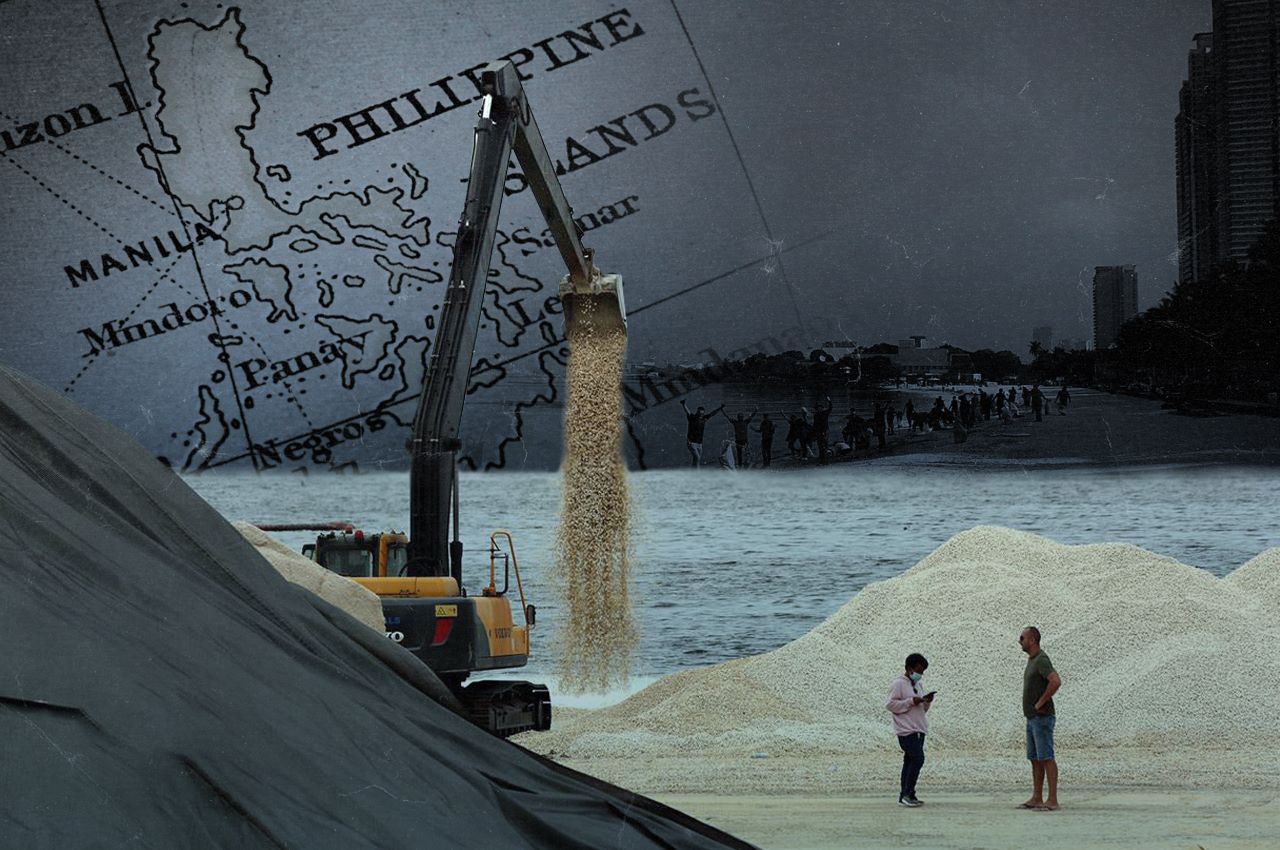MANILA, Philippines—Despite the government’s suspension of all 22 reclamation projects in Manila Bay, a militant fisherfolk group said dredging continues in the coastal waters of Cavite.
The militant fisherfolk group Pambansang Lakas ng Kilusang Mamamalakaya ng Pilipinas (Pamalakaya) on Sunday morning (Aug. 13) reported seeing vessels engaged in dredging off the shores of Rosario, Noveleta, Tanza, and Naic in Cavite.
According to the group, the dredging was allowed by the Philippine Reclamation Authority (PRA) and San Miguel Corp. (SMC) for the dump-and-fill projects in Manila Waterfront Reclamation and the Bulacan Aetropolis Project.
SMC chief Ramon Ang clarified in a BizBuzz report in Inquirer that no reclamation is ongoing for the Bulacan mega airport project.
“The project site has existing, valid land titles indicating its original status as land,” said Ang, according to the BizBuzz report.
“Due to natural processes over time, this land had become prone to regular inundation,” Ang said.
The report quoted Ang as saying that aside from flooding, fish pond conversion and over-extraction of groundwater in areas covered by the airport project made it “more susceptible to land subsidence.”
“Instead of creating new land, we are redeveloping it to its former state, ensuring its productive and sustainable use for the future,” the billionaire said.
Read more: BIZ BUZZ: No Bulacan airport reclamation
The vessels spotted by Pamalakaya were seen just three days after Environment Secretary Maria Antonia Yulo-Loyzaga announced that all 22 reclamation projects in Manila Bay are suspended.
READ: DENR clarifies: All Manila Bay reclamation projects are suspended
Yulo-Loyzaga’s statement followed President Ferdinand “Bongbong” Marcos Jr.’s pronouncement that all but one reclamation project were suspended—a decision that was welcomed by various groups and civil society organizations.
READ: ‘Resounding victory’ for people: Manila Bay reclamation halt hailed
“These dredging operations that complement various reclamation projects in Manila Bay are supposed to be covered by the suspension order from the President,” said Fernando Hicap, Pamalakaya national chairperson.
Small fishers suffer losses
Pamalakaya said since dredging began two years ago, small fishers in Cavite lost 80 percent to 90 percent of their daily income.
In a previous two-part report published in INQUIRER.net, Edwin Rosales, a fisherman from Limay, Bataan province, said he had been forced to venture farther out to Bulacan or Cavite provinces where the yield has been dwindling due to various dredging vessels frequenting the area.
Rosales recalled that on at least two occasions, dredging vessels had “run over” his net because he “couldn’t get out their way fast enough.”
READ part 1: Seabed quarrying ‘crowding us out,’ say Manila Bay fisherfolk
Numerous large vessels had entered old fishing grounds in Cavite and dredged the seafloor, which, as a result, devastated and damaged the marine ecosystem in the area.
According to Fernando Siringan, a marine scientist from the University of the Philippines-Marine Science Institute (UPMSI), dredging and seabed quarrying cause the seafloor to be too muddy for fish to stay.
Data from the Environmental Management Bureau (EMB) as of January this year showed that two operations are located in the coastal waters of Cavite: the San Nicholas Shoal Seabed Quarry Project of VIL Mines Inc. (covering some 8,530 hectares) and the Seabed Quarry Project of the PRA (covering 5,000 hectares).
Fisherman Angelo Dula said he could no longer go to his usual fishing areas near Cavite since the various quarrying operations started. He also said he had encountered the dredging vessels up close when they dislodged his nets and laid his day’s work to waste.
“They would just run over our nets like they own the sea; they don’t care at all,” he said. “They don’t even try to avoid them.”
READ part 2: Fishers urged not to venture into Manila Bay, told it’s ‘dead’
Ensure accountability, declare reclamation-free zone
In separate statements, Pamalakaya said giant firms involved in the reclamation projects—including dredging and seabed quarrying in Manila Bay—should be held accountable by requiring them to provide sufficient financial and economic compensation to affected fisherfolk and coastal families.
“We are currently assessing the damages inflicted by [the] reclamation [projects] to fishery resources in Manila Bay, and the incomes lost to fisherfolk and other fishery-related jobs,” said Hicap.
The group called on the President to certify as urgent the House bill filed by Makabayan bloc last year declaring Manila Bay as a “reclamation-free zone.”
Pamalakaya noted that the bill is pursuant to the 2008 Supreme Court continuing mandamus to rehabilitate, clean up, and restore Manila Bay for recreational use and fishery resources development.
“We reiterate that unless an official Executive Order or legislation banning reclamation is issued, President Marcos Jr.’s verbal declaration is toothless and holds little weight,” Hicap said.
TSB
RELATED STORIES:
Manila Bay reclamation works suspended amid US concern, floods
Manila Bay not dead, but reclamation killing it, say groups
